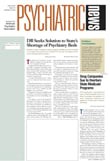There is a trickle of good news about Medicare, although the glass isn’t yet half full.
On June 28 the federal government’s Centers for Medicare and Medicaid Services (CMS) approved the inclusion of psychiatric diagnostic interviews as a reimbursable telehealth service under its updated physician fee schedule. The expansion will be effective January 1, 2003.
The addition came about as the result of APA’s argument to CMS that an initial diagnostic interview is necessary for effective psychiatric treatment to take place. CMS previously had permitted reimbursement for psychiatric telehealth services, but had not included a code for diagnosis.
William S. Herz, M.D., co-chair of the APA Caucus of Rural Psychiatrists, told Psychiatric News, “This recent action corrects a significant, although apparently accidental, omission in the original reimbursement authorization.”
He said that the addition should be helpful at rural mental health centers that already have been able to set up telehealth programs, but noted that there are still considerable obstacles for many of those centers to billing Medicare successfully.
Medicare Appeals Process
Medicare beneficiaries are also one step closer to establishment of a national appeals process, as a result of a lawsuit filed August 6.
The suit came about because CMS reversed a decision made in October 2001 to allow Medicare reimbursement for a treatment for macular degeneration using the drug verteporfin (Visudyne). In March, when CMS announced its reversal of that ruling, Medicare beneficiaries attempted to appeal and were told that the agency didn’t have appropriate regulations in place.
The American Association of People With Disabilities, American Council of the Blind, Gray Panthers, and Medicare beneficiaries then sued CMS because it had not established a process for beneficiaries to appeal the decision.
NCDs Can Be Challenged
The legal grounds for the suit are in the Medicare, Medicaid, and SCHIP Benefits Improvement Act of 2000 (BIPA). Section 522 of BIPA says that “any aggrieved party” can challenge a Medicare National Coverage Determination (NCD).
NCDs are decisions about Medicare reimbursement that are binding throughout the country.
According to the AMA, CMS has issued fewer than 200 NCDs, but in recent years they have become more common.
The law stipulates that challenges to NCDs should be reviewed by the Departmental Appeals Board of the Department of Health and Human Services. The appeals process was to be in place by October 1, 2001.
According to the September 2 American Medical News, CMS Administrator Thomas Scully said, “Unfortunately, when Congress enacted the provisions addressing appeals, it did not provide additional funding to the Medicare program for the associated costs. Consequently, this has caused some delays in implementing this new process.”
On August 22, just a couple of weeks after the suit was filed, CMS published a proposed regulation for NCD appeals in the Federal Register.
Chester W. Schmidt Jr., M.D., chair of APA’s Committee on RBRVS, Codes, and Reimbursements, told Psychiatric News, “Certainly, it is good news that Medicare beneficiaries will finally have an opportunity to appeal NCDs, particularly since those decisions are becoming more common and affect large numbers of patients and physicians.”
APA’s Division of Government Relations is preparing to submit comments to CMS on the proposed regulation.
On June 28 CMS published in the Federal Register a proposed regulation that would change the productivity adjustment factor. That factor is used to help determine the impact of inflation on the cost of physician supplies and services. It is a key element in the formula that CMS uses to determine Medicare’s physician payment rates.
The result of the change would be to decrease the current estimate of the 2003 pay update from a 5.4 percent cut to a 4.4 percent cut.
The failure of the House of Representatives and Senate to agree on a prescription drug bill stalled other efforts to improve the physician payment schedule.
HR 4954 included a three-year fix of the physician update formula in addition to adding a prescription drug benefit. The legislation would have resulted in a payment increase of about 2 percent for physicians treating Medicare patients for each of the next three years.
Congress adjourned for its August recess before the two chambers reached agreement on prescription drug benefits or physician payment under Medicare.
According to the August 19 American Medical News, Sen. Max Baucus (D-Mont.), chair of the Senate Finance Committee, said that he wanted the panel to vote on physician payment legislation as soon as possible after the Senate returned to work in September.
More information on the proposed appeals process is posted on the Web at www.psych.org/pub_pol_adv/medicare082702.cfm. ▪
